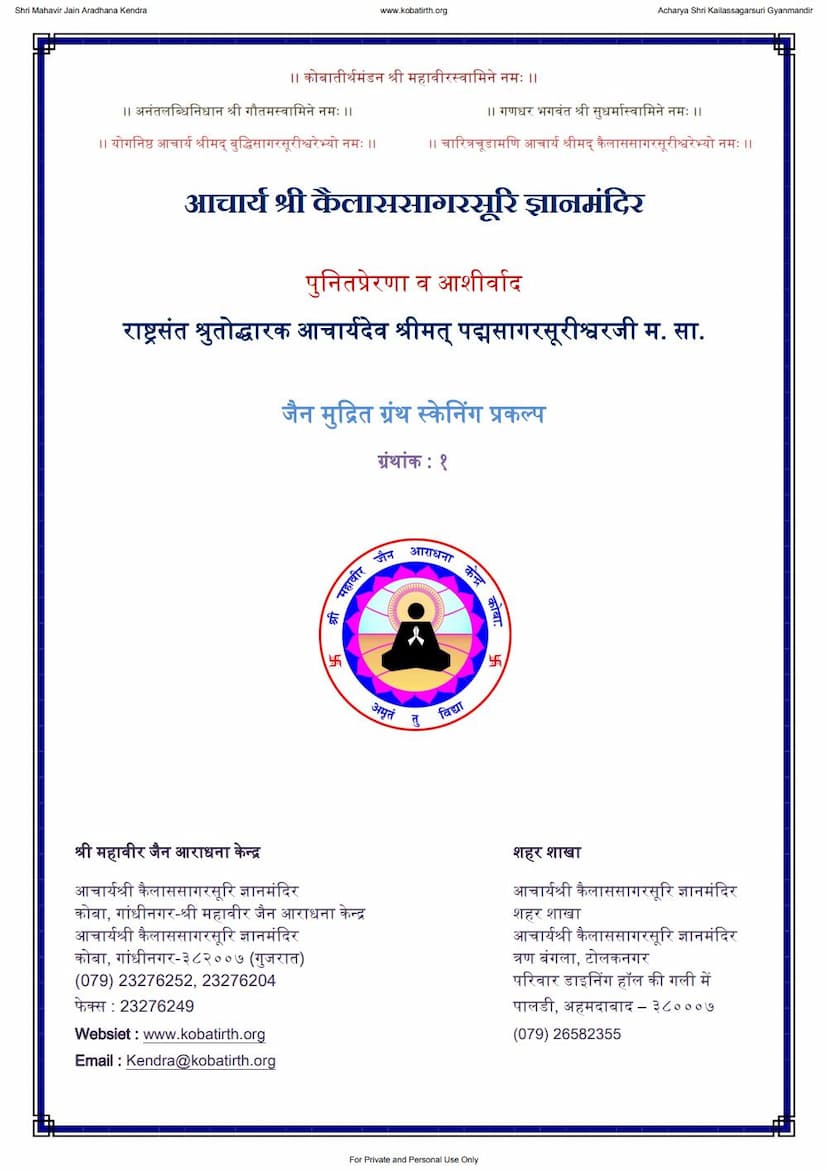Dipavalino Sandesh
Added to library: September 1, 2025

Summary
This document is a Gujarati text titled "Dipavalino Sandesh" (The Divine Message of Deepavali), authored by Ramchandrasuri and published by Jinvani Prakashan Trust. It appears to be a collection of discourses or teachings by Acharya Shri Vijay Ramchandrasurishwarji Maharaj, delivered during the festival of Deepavali.
The core message of the text revolves around the true meaning and purpose of religious practices, particularly in the context of Jainism, and the ultimate goal of liberation (moksha). Here's a breakdown of the key themes and arguments presented:
Central Themes:
- The True Purpose of Dharma: The text emphasizes that Dharma (righteousness, religious duty) should be performed with the sole intention of attaining Moksha (liberation from the cycle of birth and death). Actions performed for worldly gains, fame, or pleasure are not considered true Dharma.
- Distinguishing True Dharma from Worldly Desires: The author strongly criticizes performing religious acts for the sake of acquiring wealth (Artha), sensory pleasures (Kama), or worldly reputation. These are termed "unrighteous" or "misguided" pursuits.
- The Four Purusharthas (Aims of Life): The text discusses the four traditional aims of life: Dharma, Artha, Kama, and Moksha. However, it clarifies that while Artha and Kama might seem like aims, they are ultimately described as "nameless" or "illusory" (Namamatrata) in the ultimate spiritual sense (Paramarthatah). Moksha is presented as the only true, meaningful aim (Paramarthata).
- The Importance of Intent (Bhav): The quality and fruit of any religious action depend heavily on the intention behind it. Actions performed with attachment to worldly desires, even if seemingly religious, lead to the accumulation of negative karma (Papanoobandhi Punnya). True Dharma, performed without attachment (Nirashasbhav), leads to positive karma (Punyanubandhi Punnya) and ultimately to liberation.
- The Teachings of Lord Mahavir Swami: The text draws heavily on the final teachings (Antim Deshna) of Lord Mahavir Swami, emphasizing the profound wisdom contained within them. The lengthy duration of his final sermon is explained through the power of his divine music-like discourse and the innate ability of listeners to understand.
- The Nature of True Devotion and Practice: The text advocates for performing religious duties with sincerity, a focus on spiritual growth, and a detachment from worldly outcomes. It stresses the importance of understanding the underlying principles of Jainism rather than merely mimicking rituals.
- The Dangers of Misinterpreting Scriptures: The author warns against misinterpreting scriptures to justify worldly desires or personal gain. Such interpretations are labeled as "unrighteous teachings" (Unmargapranupana) and are detrimental to spiritual progress.
- Tapasya (Austerity) and the Ascetic: The text highlights the importance of genuine Tapasya and the qualities of a true ascetic. True Tapasya is not for worldly gain or fame but for the destruction of karma (Karmnirjara). Ascetics should cultivate self-control, detachment, and devotion to the teachings of the Tirthankaras.
- The Significance of Deepavali: While the text's title refers to Deepavali, it uses the occasion to deliver its spiritual message, urging readers to find the true "light" of spiritual knowledge and liberation rather than indulging in superficial celebrations. It contrasts worldly fireworks with the "fireworks" of destroying karmas.
Key Arguments and Points:
- Artha and Kama are "Unarthbhoot" (Not Truly Beneficial): The text repeatedly emphasizes that Artha and Kama, while seemingly beneficial in the material world, ultimately lead to further entanglement in the cycle of suffering (samsara). Therefore, they are "unbeneficial" in the ultimate spiritual sense.
- Dharma is the Means to Moksha: Dharma is presented as the sole means to achieve Moksha. It is the medicine for the disease of worldly existence.
- The Duality of Karma: The concept of Punyanubandhi and Papanoobandhi Punnya is explained, highlighting how the intent behind religious actions influences the outcome.
- The Importance of Discerning Virtuous from Vicious Acts: The text urges readers to cultivate discernment to distinguish between true Dharma and actions performed with worldly motives.
- The Dangers of "Unmargapranupana": The author strongly condemns those who distort religious teachings to suit their worldly inclinations, calling them "unrighteous guides" who lead others astray.
- The True meaning of 'Dhanteras': The text reinterprets Dhanteras, suggesting that true wealth lies in Dharma and spiritual practice, not material possessions.
Overall Message:
"Dipavalino Sandesh" serves as a profound spiritual guide, urging followers of Jainism to re-evaluate their religious practices and ensure they are aligned with the ultimate goal of Moksha. It emphasizes the critical importance of intent, detachment, and a sincere pursuit of spiritual knowledge as taught by the Tirthankaras, particularly Lord Mahavir Swami. The text acts as a strong caution against mistaking worldly desires or superficial rituals for true spiritual progress.